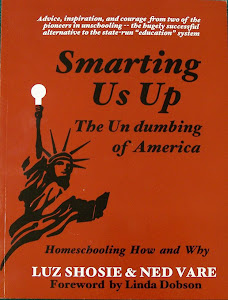“The mass dumbness which justifies official schooling first
had to be dreamed of; it isn’t real.”– John Taylor Gatto, former NY state teacher of the year -- go to www.johntaylorgatto.com
While some citizens take the public schools for granted, trust their motives, and never question their actions, many do not. Most citizens, especially parents concerned for their children’s future, have conflicts with the schools in many areas.
Who controls the school system? Government school is a political institution and it teaches only what the government wants citizens to know, nothing else. While politicians and administrators claim that there is “local control,” meaning that communities control the schools they are forced to pay for, the fact is that federal and state agencies and teacher unions run the schools. Elected school boards merely rubber stamp the policies of others and make excuses for the many ways the schools fail children. Parents have no control at all.
The teacher union has twin goals: more money and less work. It constantly seeks smaller class size in order to gain more teacher/members to increase its income. It dominates the schools with work rules that limit the teachers in many ways. Thus, while parents often see teachers as benevolent servants of their children, the fact is that teachers are restrained from doing more than the minimum.
Parents want learning – useful skills and knowledge, perhaps even intellectual stimulation. But instead of that, government schools provide three major functions:
1. Custodial, or babysitting (some say, “lockup”)
2. Role selection--rating children for future employment slots (“meat stamping”)
3. Social conditioning, or training to accept their (low) positions in society and in expecting life to be like school – petty, conformist, snobbish, repetitive, cruel, boring (the schools call it “socialization”).
Parents want high standards, but the school system trots out a marketing slogan: “Educational excellence” – words without substance. Today when we hear about "equalization" or “standards” we should think: "standardization: lowest common denominator."
Parents and taxpayers, who must pay the bill, want the schools to be efficient while the schools see the public as an endless source of funding. The teacher unions and state educrats seek always to increase their employment kingdoms without regard to the quality of their product or its efficiency. In fact, we learn more each day about the corruption within the system. Bottom line: the community seeks value for its tax dollars while the schools seek only to maximize their revenue without regard to quality.
Parents want their children’s curiosity to be satisfied, while the schools want the children (and the parents) to be gullible and trusting. Parents want their children to learn responsibility and independence, but the schools' desired outcome for them is to become passive, manageable and dependent.
Most people harbor the dream that the schools will help make the world a better place, and yet one major goal of the establishment is to keep things as they are, despite all its rhetoric about improving its methods. The conclusion is that the school system is a major player in preventing social and economic advances. School, as we know it, is archaic and determined to remain so.
Parents want the teachers to be well educated. Yet certification does not mean that they are truly qualified or sufficiently educated even in the subjects they teach. We hear from many sources that teacher colleges and Ed. departments are not respected institutions. Even the head of Columbia Teachers College, Harold Levin, admited to the Hartford Courant that the quality of teacher colleges in America ranges between “unacceptable and embarrassing.”
Parents want the schools to serve their children. Instead, we read every day how the schools are designed and run for the benefit and convenience of their employees. The teachers’ contract tells the story. Teachers’ days are micromanaged by union rules and regulations that are agreed to by the very school boards that are presumed to work on behalf of children and the public, but do not. Instead of a learning experience, it is likely that the least beneficial part of a child’s day is the part spent in school.
Ned Vare is a Yale graduate, an architectural designer, former school teacher, businessman, author, and was libertarian candidate for Governor of CT. He appears on Guilford cable access programs; his articles appear on line at www.borntoexplore.org; he is an unschooling advocate.
Technorati Tags: [public school], [schools conflict with parents], [dumb down], [corruption], [psychological conditioning].
Subscribe to:
Post Comments (Atom)


2 comments:
Ned, thank you for your passionate commentary. When talking to people with their students in government schools, it seems that they frequently blame the school's problems on the Federal Government and duh, duh, dah, daaahhhh (scary intro music) . . . No Child Left Behind. I get the impression that the parents are being coached to blame NCLB instead of the school or the teacher.
Great post Ned!
Thanks for sharing your views.
Post a Comment